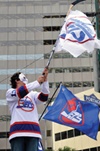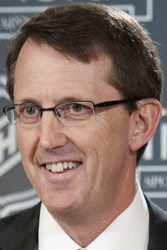Two years before purchasing the Atlanta Thrashers with the intent to move the team to Winnipeg, executives from True North Sports & Entertainment met with the Ottawa Senators, Nashville Predators and Edmonton Oilers to prepare for just such a scenario.
That due diligence, learning about everything from operational budgets to ticket sales projections for NHL clubs, should help True North as it constructs the foundation and infrastructure of an NHL franchise in barely four months before it starts play.
“Most people don’t realize that we’ve put in a lot of work to this point because we were very quiet about it,” said True North President and CEO Jim Ludlow, whose group has owned and operated the minor league Manitoba Moose since 2004. “We feel like we have a few advantages in development and planning.”
The head start is vital for True North.

Winnipeg vs. Atlanta
POPULATION:
 Atlanta: 5.3 million — Up 45% since 1997, the year the city was awarded the Thrashers; up 460% since 1990, the year the Atlanta Flames relocated to Calgary.
Atlanta: 5.3 million — Up 45% since 1997, the year the city was awarded the Thrashers; up 460% since 1990, the year the Atlanta Flames relocated to Calgary.
 Winnipeg: 764,000 — Up 15% from 1996, the year the Winnipeg Jets relocated to Phoenix.
Winnipeg: 764,000 — Up 15% from 1996, the year the Winnipeg Jets relocated to Phoenix.
PRO TEAMS:
 Atlanta: Atlanta Braves (MLB), Atlanta Hawks (NBA), Atlanta Falcons (NFL), Atlanta Dream (WNBA), Atlanta Beat (WPS )
Atlanta: Atlanta Braves (MLB), Atlanta Hawks (NBA), Atlanta Falcons (NFL), Atlanta Dream (WNBA), Atlanta Beat (WPS )
 Winnipeg: Winnipeg Blue Bombers (CFL), Manitoba Moose* (AHL )
Winnipeg: Winnipeg Blue Bombers (CFL), Manitoba Moose* (AHL )
| |
Atlanta |
Winnipeg |
| 2010-11 pro sports attendance |
4.7 million |
616,022 |
| No. of major corporate headquarters |
77^ |
30 |
| Arena (built) |
Philips Arena (1999) |
MTS Centre (2004) |
| Hockey capacity |
18,545 |
15,015 |
| Suites |
101 |
50 |
| Club seats |
1,866 |
918 |
| Concessionaire |
Levy Restaurants |
Centerplate |
| Premium-seat caterer |
Levy Restaurants, Buckhead Life Restaurant Group |
Centerplate |
| Pouring rights |
Coca-Cola |
Coca-Cola |
* Expected to be replaced by the new NHL franchise
^ 10 of these are Fortune 500 companies; there are no Fortune 500 listings for Canadian companies.
Sources: U.S. Census; Statistics Canada; Fortune magazine; 2011 Sports Business Resource Guide & Fact Book
The new franchise owners face a long list of business challenges before the puck drops on the 2011-12 NHL season in October. The organization must choose a team name and develop a brand that either touches the old NHL Jets’ 17-year history, or forges a new identity. It must sign a local television deal for a geographic region the size of Texas with a population smaller than that of Brooklyn. It must hire personnel to reach the staff size needed to run an NHL club, and renegotiate sponsorship deals in one of the league’s leanest corporate markets. And it must convince hockey fans who pay as little as $15 for Moose tickets to pay premium prices for the new NHL product.
“It’s a tight time frame by anybody’s measure,” said Carolina Hurricanes general manager Jim Rutherford, who oversaw the league’s most recent relocation — the Hartford Whalers’ 1997 move to Raleigh. “When you’re moving a franchise, you’re looking at a good 12 to 18 months in order to do it right.”
Ludlow said True North is already making headway. The group has created a budget for the team, which he declined to discuss. A team source said the budget will be similar to that of Ottawa, which last year spent $60 million on player salaries. A source close to the NHL said the league’s average team operating budget is in the $80 million to $90 million range.
On June 1, the day after announcing the purchase of the franchise from the Atlanta Spirit for $170 million, which includes a $60 million relocation fee, True North released a seven-tiered season-ticket price range for Winnipeg’s MTS Centre. The cheapest seat is $39 a game, and the average price is $89 — the second-highest among the now seven Canadian NHL clubs. True North will increase the building’s suite total to 55, and those suites will sell for between $150,000 and $197,500 a year.
Ludlow said the group hopes to earn upward of $40 million annually from ticket sales, and the club will rely on selling out the building, which at 15,015 seats is the smallest in the NHL by more than 1,000 seats.
Supporting an NHL team with 55 suites could work in Winnipeg with the additional premium-seat options, said Bill Rhoda, a facility consultant with CSL International.
“The primary issue with a small building in general is the pressure it creates to sell out throughout the year,” Rhoda said. “You don’t have the luxury of being able to accommodate 20,000 when the Maple Leafs play on a Saturday night and then 12,000 for the Phoenix Coyotes on a Tuesday night.”
Sources agreed that the team’s primary goal should be choosing a name.
SME Branding partner Ed O’Hara, who developed brand strategies and logos for the Thrashers, Tampa Bay Lightning and Los Angeles Kings, among other clubs, said a team rebranding campaign generally takes 10 months to workshop logos and jersey designs. “Sitting with fans one on one you can find out if there is emotion for [a brand],” O’Hara said. “Teams want to skip that, but you can’t probe those questions in a survey.”
Ludlow said True North has discussed name ideas with the NHL, including a return to the Jets brand as well as creating a new identity. He said time constraints will force the group to pick a name before the June 21 board of governors meeting in New York, where the NHL will vote to approve the new owners.
True North does have a series of advantages on the NHL teams that changed markets in the 1990s — the Hurricanes; Phoenix Coyotes, from Winnipeg in 1996; Colorado Avalanche, from Quebec in 1995; and Dallas Stars, from Minnesota in 1993.
Meet The Owners
MARK CHIPMAN
■ Founder and chairman, True North Sports & Entertainment Ltd.
■ Governor, AHL Manitoba Moose
■ Former chairman of the executive committee, AHL board of governors
n President, Winnipeg-based Megill-Stephenson Co., a private company that owns Birchwood Automotive Group and real estate developments across Canada
■ Education: B.A., economics, University of North Dakota (1983); J.D., University of North Dakota (1985)
■ Worth noting: Honored with the AHL’s James C. Hendy Memorial Award as the league’s top executive following the 2004-05 season; born and raised in Winnipeg; lettered in varsity football at North Dakota
DAVID THOMSON
■ Minority shareholder, True North Sports & Entertainment Ltd.
■ Chairman, Thomson Reuters Corp.
■ Chairman, The Woodbridge Co. Ltd. (Toronto), the principal and controlling shareholder of Thomson Reuters
■ Chairman, TR Organisation Plc. (London), a subsidiary of Thomson Reuters Corp.
■ Education: M.A., history, Selwyn College at University of Cambridge (England)
■ Worth noting: Named the richest Canadian with a net worth of $19 billion in June 2010, according to Forbes magazine; Thomson’s commercial real estate firm, Osmington, owned the land on which the team’s home, the MTS Centre, was built; became the 3rd Baron Thomson of Fleet, a British peerage, on his 49th birthday
True North partner Mark Chipman is a Winnipeg native who formerly presided over the province’s largest car dealership and a major real estate developer. His business partner is billionaire David Thomson, the wealthiest man in Canada. The group already owns the MTS Centre and employs 90 full-time staff there and approximately 70 employees at its two other venues, the MTS Exhibition Hall and MTS Iceplex. Ludlow said the group will make sizable staff additions in hockey operations, however its core business group will grow incrementally. By comparison, Ottawa has 130 full-time employees.
“When it comes to operating a building, we’ve been working at this for years,” he said.
The company also has a healthy portfolio of corporate partners, including MTS, Labatt, Moosehead and Toyota, among others. Ludlow said he will renegotiate contracts with the partners for NHL-sized revenue, but declined to say how much a corporate partnership with the team will be worth. AHL teams regularly sign six-figure deals in the beer and automotive categories, and NHL deals in these categories range in the low to mid-seven figures
“People say that our corporate market isn’t strong, and I disagree with that fully,” Ludlow said. “There is a lengthy list of corporate offices in Winnipeg.”
And unlike the league’s southern expansion of the ’90s, the franchise formerly known as the Thrashers is moving into a mature hockey market. Sources familiar with the league said the Winnipeg team could fetch between $4 million to $7 million for a local television rights deal, which is in the lower half of NHL local TV rights fees and is comparable with what the Thrashers earned from Fox Sports South.
David Masse, senior director of CBC Sports, said increased competition between Rogers Sportsnet, TELUS, CTV and Shaw Communications for regional sports contracts could drive up the price, as could the excitement of seeing an American team move to Canada.
“The entire country seems to be interested that Winnipeg is getting a team,” Masse said. “It looks like they should have a decent fan base beyond [Winnipeg].”
Still, Ludlow conceded that much of the work in the coming months will need to be done on a compressed schedule, much like the negotiations for the team sale. But even then, former NHL executive Ed Horne said, any disadvantages created by the shortened time frame and small building will be offset by the market’s inherent advantages.
“You have the building and the organization in place, you’re just now running things on an NHL scale,” said Horne, who added that the long-term success of the club will be determined by ticket sales. “You have a rabid hockey base, you have history and a heritage, and those are factors that most relocations just don’t have.”
Staff writer Don Muret contributed to this report.






